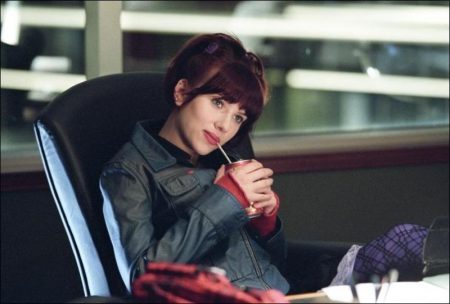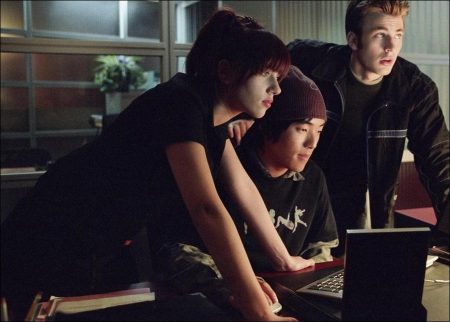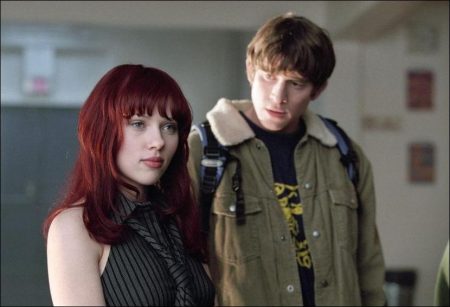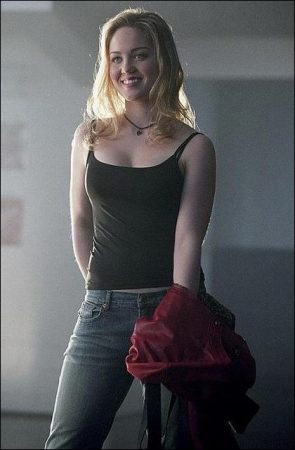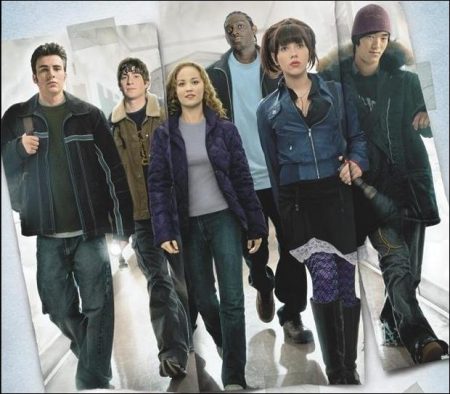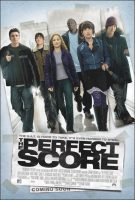Tagline: The S.A.T. is hard to take, it’s even harder to steal.
The Perfect Score is a story about six high school seniors that band together to steal the answers to the college SAT exam. They have discovered that this one test will determine their future, and the college that will admit them. Each student has his or her own reasons for deciding to become criminals and beat the system.
They have justified their act by concluding that the test is unfair and discriminates against them; therefore, it is ok to steal the test. Lucky for them, the father of one in the group owns the building where the testing company is located. This student gets the building plans, and she also has a door card key. Their lives change with this one act, maybe for the better. Douglas Young (the-movie-guy)
The Perfect Score is a 2004 American teen heist film directed by Brian Robbins, starring Erika Christensen, Chris Evans, Bryan Greenberg, Scarlett Johansson, Darius Miles, and Leonardo Nam. The Perfect Score has similarities to other high school films, including The Breakfast Club (1985) and Dazed and Confused (1993), which are often referenced throughout the film.
The Perfect Score was panned by most critics and performed poorly at the box office. The film opened in 2,208 theaters and grossed $4.8 million, making for a $2,207 per-theater average. Placing fifth over the weekend, the film saw sharp declines in following weeks and ended its domestic run with $10.3 million.
About the Production
The ethics and practice of standardized testing have become an increasingly hot topic of national debate. The SAT testing system is a heavily integrated part of the American education system while also being a very large and profitable business. Of the 2.8 million kids who graduated from high school in 2002, 1.3 million took the SAT test, and some reports estimate college test-prep to be a $250 million industry.
Interestingly enough, house-hunters have been known to inquire about the SAT scores of children in a particular neighborhood before buying a home, and some real estate companies go as far as listing different areas’ average SAT scores on their website. The test has controversially been said to show an unfair bias against certain racial, ethnic and gender groups, leaving various minority representations in colleges across the country significantly unbalanced.
Because of years of controversy over the fairness of the SAT, the much-scrutinized test is now set for a little revamping, according to an article written by education reporter Jay Mathews in the November 2003 issue of The Atlantic Monthly. Entitled “The Bias Question,” the article states: “A revised version of the SAT, to be introduced in March of 2005, will add grammar questions and a written essay, replace quantitative comparisons with second-year algebra questions and replace analogies with more reading questions.”
“I’ve often questioned the ethics of standardized testing, and I feel that the importance placed on SAT scores has too much of an effect on a kid’s future,” says Robbins. “Today’s higher educational environment is very challenging because it’s much harder to get into top colleges. In turn, it becomes more difficult to get into second-tier colleges as well. All this adds pressure on top of the everyday challenges kids face just growing up, and we wanted to tap into that.”
Scarlett Johansson, who garnered rave reviews for her breakout performance in Sofia Coppola’s recent hit, “Lost in Translation,” as well as “Girl with a Pearl Earring,” appears as the fiercely independent Francesca in “The Perfect Score,” and believes the film raises a lot of really interesting questions.
“One of the questions asked is how can a test grade a person’s determination’ I mean, a bad score on the SAT can actually overshadow someone’s drive,” explains Johansson. “And besides the SAT question, the film brings up the issue of transitioning from a child to an adult, and learning to be true to yourself.”
Producer Roger Birnbaum couldn’t agree more. “The pressure and the anxiety that kids face surrounding the SAT is not a healthy thing,” he points out. “Besides that, it doesn’t make sense. A kid can be a terrific student but be prohibited from getting into a good college simply because he isn’t a good test taker.”
Setting out to create a character-driven script using the culture of the SAT exam as the backdrop, screenwriter Mark Schwahn remembers taking the test and the anxiety accompanying it. “When I took the SAT, it wasn’t nearly the profitable, pressure-driven institution that it is now. Clearly, today the stakes are much higher and I think the film brings that across in a very human, authentic and funny way.”
When casting, the filmmakers decided that they wanted unknown actors over celebrity names, and looked for individuals with whom young audiences could identify. Chosen for the role of Anna, the overachiever who desperately tries to live up to her parents’ high expectations, was Erika Christensen, the young actress whose extraordinary performance in the Academy Awardâ -winning “Traffic” wowed audiences and critics alike.
“What really attracted me to the project was the script,” remembers Christensen. “It was a nice balance between the craziness of teenage life and those poignant little moments that happen between kids in high school. It really captured the whole struggle of growing up, wondering what you’re going to do and how you’re going to spend the rest of your life.”
Describing her character as someone who has missed out on a social life because she’s so busy living up to her parents’ dreams, Christensen points out that Anna is at least one of the luckier kids. “Her parents care, and that’s much better than their not caring at all, but at a certain point, parents really need to let their kids be who they are.”
Scarlett Johansson says that her role of the freethinking Francesca was an easy one for her to slip into, and she liked the way the screenplay captured high school life. “The script was one of the first I’ve read about teenagers in which the lingo, the situation and the relationships between the kids is authentic and not some middle-aged person’s version of what’s supposed to be cool,” recalls Johansson. “At the time I read it, I was 17, so I was looking at it through a 17-year-old’s eyes, and it seemed very real to me.”
After casting the two female leads, the director and producers set upon the task of finding other talented young actors to complete the ensemble. When deciding who would portray Desmond, the high school basketball star who finds himself at the pivotal point of choosing between going to college or going pro, director Brian Robbins knew who was meant for the role: a basketball phenom himself, Darius Miles, who currently plays for the Cleveland Cavaliers.
“I can definitely relate to my character,” says Miles, the real-life NBA pro basketball star, who was the first player drafted straight out of high school by the Los Angeles Clippers. “In fact, Desmond’s story practically mirrors my own. We both have very strong mothers who pushed us to do the right thing, and like him, I also had trouble passing the SAT. The difference is, Desmond decides to go to college first, and then the NBA, but at least I do plan to go back to college. I even promised my mother I would!”
One of the greatest casting challenges the filmmakers faced was trying to find an actor to play Kyle, the aspiring architect who serves as the ringleader behind the heist as well as the narrator of the film. Director Robbins says they chose Chris Evans not only for his good looks, but also his personality. “Chris really comes across as an all-around nice guy, with peers who look up to him,” observes the director. “He was perfect for the role, projecting a take-charge attitude, but still showing a sensitivity. I think both guys and girls will relate to him.”
As for Evans, he thought the script had a lot of heart and took on a subject a lot of high school students are thinking about. “When it comes down to it, the college you go to and the career you choose can be pretty impactful on your life, especially when you’re around the 17 to 19-year-old range,” says the actor. “That’s the age you’re making some concrete decisions that could alter your entire future and it’s difficult to trust yourself, let alone all the people you’re trying to please.”
Evans recalls a particular scene that’s very telling about what it means to trust and how difficult that can be when you’re hanging with people outside your usual circle of friends. “We’re all meeting for the first time to discuss the heist and how it’s going to all go down,” remembers the actor. “We have blueprints, pictures and a solid plan of action, but everyone doesn’t really know one another. We’re from different backgrounds and we don’t run in the same circles, and yet we have to learn to trust one another for our own benefit.”
Bryan Greenberg, who won the role of Matty, describes his character as a blue-collar kid with a big heart. “Matty’s not really particularly good at anything, except trying to be happy,” says Greenberg, “and I thought that was a great quality. I mean, isn’t that what we should all be trying to do’”
Providing most of the comic relief in the film is Leonardo Nam, who portrays Roy. “He’s sort of from another planet, and no one is ever really sure what he’s going to do or say next’including him,” laughs Nam. “I think his character is so happy-go-lucky, you can’t help but like him.”
The ensemble cast was built with the hope that the actors could tap into personalities and characters found in any given high school anywhere. Erika Christensen hopes that audiences recognize a little bit of themselves in each of the characters.
“I think these characters represent distinct and real groups of people, and when they are all put together, become one person, ” she explains. “Roy represents the craziness and Kyle represents the part of everyone that tries to hold things together and make things right. Anna represents the romantic who’s always striving to figure out what she wants, Francesca is the cynic, Matty is the innocent, and Desmond is the cool guy who’s at the top of his game. You put these all together and they’re real people who have these great moments, and in them, I think audiences will see people that they know.”
Screenwriter Mark Schwahn feels that Christensen has nailed exactly what he was after — to create universal characters that speak to young people. “These kids seem to be so different from one another in the beginning,” says Schwahn. “They seem to come from such different places and such different worlds, but in the long run, they’re very similar, and not unlike all of us were in high school.”
The Perfect Score (2004)
Directed by: Brian Robbins
Starring: Erika Christensen, Chris Evans, Bryan Greenberg, Scarlett Johansson, Leonardo Ram, Vanssa Angel,Tyra Ferrell, Matthew Lillard, Lorena Gale, Lynda Boyd
Screenplay by: Mark Schwahn, Marc Hyman, Jon Zack
Production Design by: Jaymes Hinkle
Cinematography by: Clark Mathis
Film Editing by: Ned Bastille
Costume Design by: Melissa Toth
Set Decoration by: Johanne Hubert
Art Direction by: Sandi Tanaka
Music by: John Murphy
MPAA Rating: PG-13 for language, sexual content and drug references.
Studio: Paramount Pictures
Release Date: January 30, 2004
Box Office Totals
Domestic: $10,391,003 (95.5%)
Foreign: $485,802 (4.5%)
Total: $10,876,805 (Worldwide)
Views: 182
